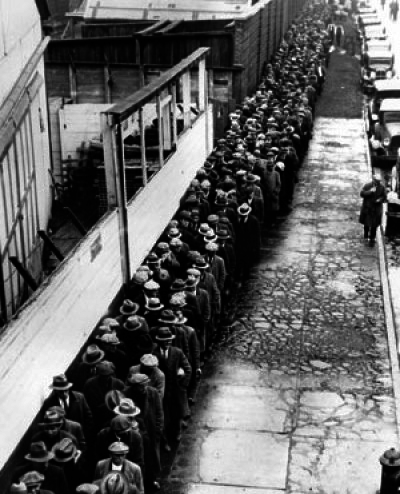"If you want the rainbow, you have to put up with the rain." - Dolly Parton
The line is a necessary evil. It is at once both a help and a hindrance to society. On the one hand it maintains order and keeps groups of people from degenerating into chaos. One the other hand it forces people to wait, often needlessly, for hours on end. Is there any way around such a system?
In Ukraine the answer is “yes”. Lines are still in wide use in Ukraine at the post office, the grocery store, and in fast food restaurants, but in other less regulated areas like outdoor markets and even at the train station, lines appear to be optional.
I still remember the first time someone cut in front of me in line in Kiev. I was standing in line for food at a small shop and I was busy trying to figure out how to say what I wanted to order in Russian. Apparently I took a bit too long to say what I wanted, because the person behind me simply stepped beside me and ordered something before me. I was outraged that someone could so blatantly cut in front of me without even asking or apologizing.
In the USA lines are taken seriously. If someone is in front of you they have the right to go first, no matter what. If you are in a hurry or you only have one item that you need to buy quickly and it is clear that the person in front of you is going to take a long time, then it is possible to kindly ask the person in front of you if you can go first. Often they will agree to let you go ahead of them, especially in the supermarket if you have one item and they have twenty.
However, the person in front of you always has the right to go first, even if you ask them nicely. If they say “no” then you have to wait like everyone else. That is where the system’s sense of justice lies, in the fact that everyone has to wait.
There are a few strategies that people have tried in order to get around this system in America. In amusement parks, for example, there are often one or two hour long lines to ride the newest roller coasters, and the technique of “saving places” has developed in which one person in a group will wait in the line, and then when they are near the front they will allow all of their friends to cut in front of them. This is still viewed by many as cutting in line and people are not always happy about it, but it is usually accepted without argument unless the group cutting in is particularly large.
The Ukrainian style of cutting is much more blunt and obtrusive. Instead of employing the rational technique of saving places in line, most people in Ukraine simply avoid the end of the line altogether and move in from the sides near the front. I call this technique the “lane change”. Just like on the highway when people drive around the traffic, sometimes driving on the sidewalk or off the road completely, people waiting in line will often stand on the side at the front of the line and push their way in towards the center.
If the line is small, people will simply stand next to the person at the front and then ask the cashier a question as soon as the first customer leaves or when there is a break in the conversation. At the train station this is a common approach and my friends and I have had to employ various blocking techniques in order to stop people from cutting in front of us at the cashier window.
My guess is that this lenient Ukrainian attitude towards lines developed during Soviet times when household goods and food items were scarce. If you simply waited in line without being aggressive, it was possible that you would not be able to get what you wanted. In that case the system was not fair, because everyone waited but only a few got what they needed. Therefore the line waiting system has degenerated in Ukraine into a system of aggressiveness. Whoever wants it most will get it first.
I believe time will fix this issue in Ukraine as problems with the availability of food and products disappear and as people realize that they no longer have to push their way to the front in order to get what they need. For now we have to employ some strategies of our own to keep those “lane changers” from taking what we really desire, which is simply respect.

